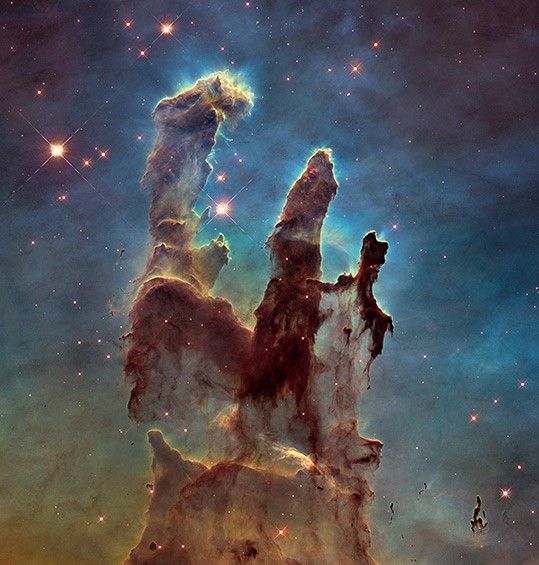1 min read
The Near Vicinity of the Black Hole at the Core of Galaxy NGC 4261 – Artist Concept

This is an illustration of how the night sky might look to a dweller in the core of galaxy NGC 4261, which harbors an 800-light-year-wide disk of dust and 1.2 billion-solar-mass black hole.
This imaginary view is from a hypothetical planet inside the dust dusk, looking toward the black hole. The black hole's white-hot glow from super-heated gas is reddened by intervening dust. A "lighthouse beam" from the hot accretion disk around the black hole, along with invisible radio jets, radiates above and below the hole at right angles to the dark dust disk encircling the hole. This dark, dusty disk bisects the sky, blocking out light from the star behind it, and reddening starlight traveling near it by optical scattering - much in the same way the sunlight turns red at sunset by scatter from dust in our atmosphere.
The imaginary planet, and surrounding stars, are destined to be swallowed by the black hole, and material in the disk spirals into its gravitational abyss.
About the Object
- R.A. PositionR.A. PositionRight ascension – analogous to longitude – is one component of an object's position.12h 19m 23.25s
- Dec. PositionDec. PositionDeclination – analogous to latitude – is one component of an object's position.05° 49' 32.49"
- Object NameObject NameA name or catalog number that astronomers use to identify an astronomical object.NGC 4261
- Release DateDecember 4, 1995
- Science ReleaseHubble Finds a New Black Hole – and Unexpected New Mysteries
- CreditIllustration by: J. Gitlin (Space Telescope Science Institute)
Related Images & Videos

Dust Disk Around a Black Hole in Galaxy NGC 4261
This is a Hubble Space Telescope image of an 800-light-year-wide spiral-shaped disk of dust fueling a massive black hole in the center of galaxy, NGC 4261, located 100 million light-years away in the direction of the constellation Virgo. By measuring the speed of gas swirling...
Share
Details
Last Updated
Aug 17, 2025
Contact
Media
Claire Andreoli
NASA’s Goddard Space Flight Center
Greenbelt, Maryland
claire.andreoli@nasa.gov





























